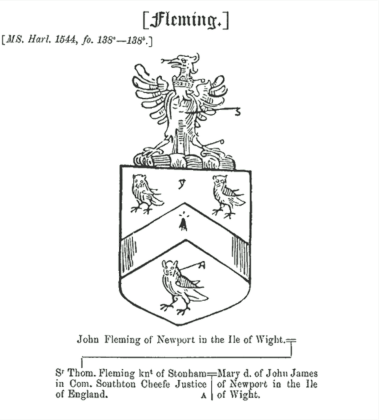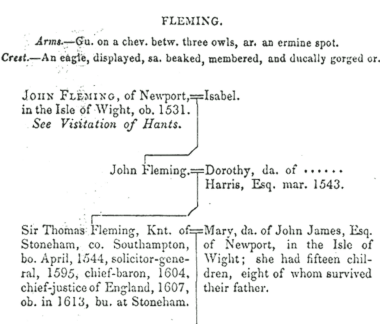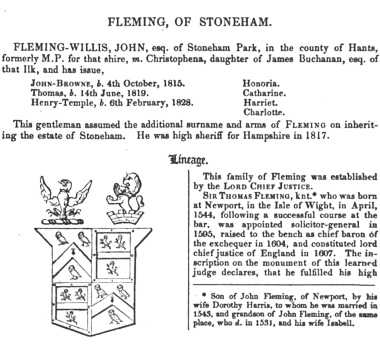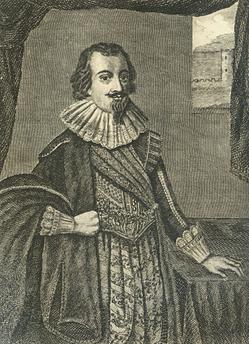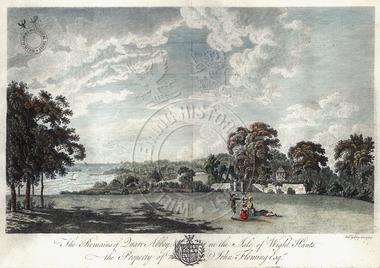As part of the Tudor Revels project, and to mark the 400th anniversary of the death of Sir Thomas Fleming (1544-1613), the Willis Fleming Historical Trust is undertaking a new genealogical study of the early Fleming family in Hampshire and the Isle of Wight. We will be focussing on the Tudor period, but linking the Flemings' lineages back to earlier times where possible. Please get in touch if you would like to join in! Find out more ...

|
|

|
|
|
|
|
|
|

Contact |
From Records to Revels: The Fleming family |
|
WelcomeThe Fleming family arms on the Bargate, Southampton
Posted by on May 3, 2012
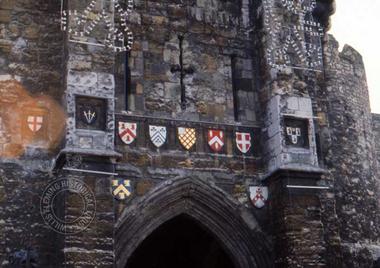 The arms of the Fleming family appear alongside several others on the north side of the Bargate in Southampton. They were added to the building early in the eighteenth century. Today the arms are rather indistinct, but in the mid-1980s they were clear and vivid as this photograph shows. The shields were last repainted in 1998. (Photo: Robert Barrett) The arms of the Fleming family appear alongside several others on the north side of the Bargate in Southampton. They were added to the building early in the eighteenth century. Today the arms are rather indistinct, but in the mid-1980s they were clear and vivid as this photograph shows. The shields were last repainted in 1998. (Photo: Robert Barrett)Printed pedigrees of the Fleming family of Stoneham
Posted by on April 24, 2012
The details of the early Fleming family of Stoneham given in the standard genealogical publications have always been scanty. The printed pedigrees took as their starting point the seventeenth-century Heralds' Visitation of Hampshire. This named only the father of Thomas Fleming, the Lord Chief Justice - as John Fleming of Newport. The excerpt below is from the Harleian Society transcript of a manuscript copy of the Visitation of 1622-34. William Berry's Pedigrees of Families in the County of Hants (London, 1833) extended the pedigree back one generation, adding several pieces of information (see below). By citing the Heralds' Visitation in this way, Berry gave the misleading impression that the Visitation was the source for the additional information and that the John (d.1531) had featured in that document. One historian took this as 'proof of the excellence of his [John's] position'.[1] The 1835 edition of Burke's Landed Gentry used the details given in Berry and added nothing new (see below). This information was repeated in all subsequent editions. [1] W. H. Davenport Adams, Nelsons' hand-book to the Isle of Wight (London, 1862), p. 181.
Le Fleming: one extended family?
Posted by on April 24, 2012
The individual Fleming family members in this study belong to two distinct lineages: the Flemings of the town of Southampton, and the Flemings of the town of Newport on the Isle of Wight. During the Tudor period, each was transformed into an armigerous landed family, the Southampton family becoming the Flemings of Broadlands (near Romsey) and the Newport family becoming the Flemings of Stoneham Park. In 1861, Woodward et al wrote of Thomas Fleming (d.1613) of Stoneham: 'It were vain to attempt to connect with his ancestry all or any of these many dwellers in and around Southampton who, from the country of their birth or descent, were surnamed le Fleming. Southampton, one of the favoured maritime towns of the kingdom, and the nearest port of the great staple town Winchester, carried on a thriving and pretty constant trade with the Low Countries; and naturally Flemings by the score settled within its walls and in the neighbourhood around.' Woodward was expressing the commonly-held belief that le Fleming was an ethnic surname adopted by many disparate Flemish immigrants. Arguably this assumption - which persists today - has dissuaded researchers from closely examining patterns of le Fleming (and variants) as a surname in the historical record and from tracing family lines in the same manner as other surnames. But we now know that the Fleming family of Southampton town was actually a single family, and that it can be traced in an unbroken line from the last male member, William Fleming (d.1606) of Broadlands - through his father Sir Francis Fleming, and grandfather, the Tudor mayor of Southampton, John Fleming (d.1528) - back ten generations to the great medieval merchant Walter le Fleming (d.1258). This dynasty played a formative part in the development of Southampton over four centuries, a process that this project will be exploring in detail. The Fleming family of Newport has only been traced back to John Fleming (d.1531) of that town, who was the grandfather of Thomas Fleming of Stoneham. So were the Southampton and Newport lineages actually branches of the same family, or had they come into existence independently? In contrast to Woodward, John Duthy, writing in 1839, believed they were indeed part of a single family: 'The family of Fleming appears to have been settled in the southern part of [Hampshire] from the time of the Normans; and for many centuries the Flemings have maintained an intimate connection with Southampton.' Family historian F. Lawrence Fleming has suggested that all the early Fleming families in Britain were branches of a single extended family descended from Erkenbald Flandrensis of Rouen in Normandy, a Domesday tenant in Cornwall and Devon, and the son of a Flanders nobleman, Erkenbald of Saint-Omer. The surname le Fleming was a historical name that remembered the younger Erkenbald's appellation. By starting with the assumption that the individuals named le Fleming were part of a single Norman family - like the Beauchamps or Granvilles - so new patterns emerge in the surviving records and it becomes possible to formulate a compelling genealogy. Drawing on this evidence, F. Lawrence Fleming has reasoned that Walter le Fleming, the progenitor of the Southampton town Flemings, was a great- or great-great-grandson of Erkenbald Flandrensis, who had previously been cited as the progenitor of some of the other prominent Fleming families such as the Earls of Wigton in Scotland and the Barons Slane in Ireland. In his new paper, 'The Ancestry of Walter le Fleming, Burgess of Southampton', F. Lawrence Fleming shows how Walter le Fleming might fit into this lineage. If the Fleming family of Southampton was indeed part of this one extended family - and the Fleming surname was not so regularly adopted by Flemish immigrants - then it does seem likely that the Flemings of Newport/Stoneham were a branch of the Southampton family. Bibliography: John Duthy, Sketches of Hampshire (Winchester, Jacob and Johnson, 1839). F. Lawrence Fleming, The ancestry of the Earl of Wigton and other essays relating to the family history of the Flemings (Rotherstorpe: Paragon, 2011). B. B. Woodward, T. C. Wilks, C. Lockhart, A general history of Hampshire (London: Virtue, 1861). The drunken Flemings
Posted by on April 6, 2012
Sir John Oglander (1585-1655) John Oglander of Nunwell did not approve of Thomas Fleming's purchase of Quarr Abbey on the Isle of Wight in 1609. He thought Thomas was a parvenu; Thomas's father - 'the most miserable of men' - had 'sowlde small wares in Nuport'. Oglander wrote: 'That which once the Abbots fat And sluggish monks did feed, The drunken Flemings now doth scrape, With gain thereof, to raise their seed. Oglander d escribed the descent of Quarr Abbey : 'Richard Milles bowght it on ye dissolution ... Richard dyed, and left it to his son George, who maryed an heyre in ye north and lived woorshippfully; was a Justice of Peace, and kept a brave howse. He dyed without issue, and left it to his brother's son, Sir Richard Milles, who sowlde it (for nothinge) to Sir Thomas Fleminge, Lord Chyfe Justice of ye King's Bench, whose father was a merchant in Nuport ... So nowe you may see ye greate Abby of Quarr, founded by Baldwin Ryvors, nowe come to ye posteritie of a merchant of Nuport. O tempora, O mores. Such is the inconsistency of Fortune, which, by the tide of her servant Time, pulleth down great things and setteth up poor things. Now it is turned from monks to drunken Flemings after it had continued on the Lord Abbot's hands 390 years, relieved many poor and done much good by preaching the Gospel in many parts.' But Oglander also suggested a long-standing link between the Fleming family and the Abbey. The Abbey's founder, Baldwin de Redvers 'brought owt of ye Lowe Countrye one John le ffleminge, a good Free Mason, whom he imployed abowt ye mason woorke for ye bwyldinge of Quarr. Ever since as poore men ye name hath continued le ffleminge, and now one derived from him hath honour of his awncestor's bwyldings; but little did Ryvors imagine this when he brought him owt of Germanie.' |
